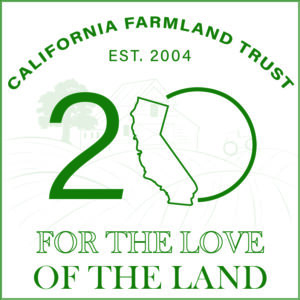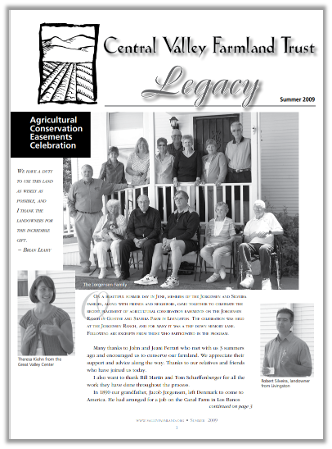 Central Valley Farmland Trust is Born
Central Valley Farmland Trust is Born
~ By Vicky Boyd
When representatives of four farmland conservation groups met in late 2003, they agreed that the status quo probably wasn’t the best way to protect agricultural land moving forward. Then the discussion evolved around possible new structures. Should the Sacramento and San Joaquin County groups band together? Should groups from Stanislaus and Merced counties form their own organization or remain independent? Or should the four join together to create a new farmland trust and hire an executive director who could strengthen community ties and conduct formal fundraising?
Based on formal discussions as well as informal chats during breaks, Denny Jackman — a participant and Modesto City Council member at the time — said representatives from all four groups favored forming a new farmland trust.
“We coalesced and started working together through the Great Valley Center,” he said about the Modesto-based nonprofit organization that facilitated the meetings. “There was strength in numbers, and there was strength in backgrounds.”
Tim Byrd, a Stanislaus Farmland Trust founding member along with wife Suzanne, agreed. “I think they saw a larger group as being a more efficient and effective way of protecting farmland in the San Joaquin Valley. We all agreed at the meeting that it just made a lot of sense to come together in terms of efficiency instead of everybody having their own executive director and own insurance.”
Merced County Farmlands and Open Space Trust had the most easements, San Joaquin County Open Space Working Group had $200,000 in development mitigation funds, Stanislaus Farmland Trust had a formal organizational structure and the Sacramento Valley Agricultural Land Conservancy was located near the State’s capital.
Thus was born the Central Valley Farmland Trust in May 2004. The organization expanded its reach again when the Brentwood Ag Land Trust merged with it, and in 2018 the California Farmland Trust was formed.
Since the CVFT’s inception in 2004, it has protected over 17,700 acres of prime farmland on more than 83 farms in six Central Valley counties, including more recently Madera and Fresno counties.
At the heart of the California Farmland Trust are agricultural easements, which are designed to protect prime farmland threatened by development. Landowners voluntarily donate or sell their development rights to the trust through a complex set of legal agreements designed to ensure the land, the owners and the trust are all adequately protected.
Landowners can continue to farm whatever crops they want, and they’re free to sell the land or pass it on to the next generation as long as it remains in agriculture.
“It just happens to be a tool that is used by farmers to assure the land stays in farming,” Jackman said.
Gaining Momentum
The impetus for the four groups initially meeting was a report, titled “Issues and Opportunities for Agricultural Land Conservation in the Central Valley of California.” It was sponsored by a grant from the Great Valley Center, which supports activities and organizations that benefit the economic, social and environmental well-being of the Central Valley.
As meetings and discussions continued, three representatives from each of the four farmland conservation groups came to a consensus that they would like to form one group headed by a professional manager.
Susan Hooper, a part-time Sacramento County Farm Bureau staff member, attended those meetings as a Sacramento Valley Agricultural Land Conservancy representative.
“Members of the four groups had worked hard to conserve farmland for years,” she said. “They were ready to hire staff, but none of the groups individually had adequate financial resources.”
The representatives also discussed what they wanted their new organization to resemble. Because the bylaws of the Stanislaus Farmland Trust most closely fit what members were attempting, they voted to adopt those with a few minor changes, Jackman said.
In addition, they conducted focus group sessions to gauge public sentiment that were held in each of the four jurisdictions: Sacramento, San Joaquin, Stanislaus and Merced counties.
What would become the CVFT was approved in May 2004, and its first board of directors, consisting of three representatives from each of the four originating groups, was elected in June 2004. At that meeting, they contracted with Hooper to work part-time as the office administrator.
In February 2005, the trust hired Bill Martin as CVFT’s first executive director. He was based at a leased office in Elk Grove. Hooper joined Martin in April as the trust’s other full-time employee.
“Bill and I had very different skill sets,” Hooper said. “His strengths were finance and budgeting, public relations, outreach to community groups, the farming communities, and funding agencies, and crafting agricultural conservation easements. My responsibilities included managing educational outreach programs and events, coordinating all board and committee meetings, managing the accreditation and accreditation renewal process, and getting our first publication, Legacy, started.”
In 2006, the National Land Trust Alliance created the Land Trust Accreditation Commission as an independent review program. To become accredited, land trusts voluntarily undergo rigorous assessments that examine what the commission considers best practices. Among them are fiscal accountability, organizational leadership, transactions, and lastly stewardship of the land it conserves.
In 2008, CFVT hit another landmark by becoming one of the first land trusts to be accredited with the Land Trust Accreditation Commission, and it has been reaccredited every five years since then.
“We had to provide tons of documentation,” Hooper said. “With over 600 hours of Bill’s and my time, becoming accredited that first time was a huge undertaking.”
Jeani Ferrari, who was among the founders of the Stanislaus Farmland Trust, was on the board when it merged with three regional land trusts to form the Central Valley Farmland Trust in 2004.
“When I left the board, California Farmland Trust was doing great work. I don’t think there’s a farmland trust, anywhere, that does more important work. Executive Director Charlotte Mitchell is a remarkable team leader.”
This article is one of a series of articles highlighting the history of the California Farmland Trust, which celebrates its 20th anniversary in 2024.

